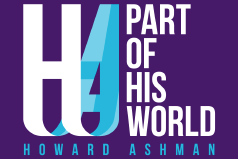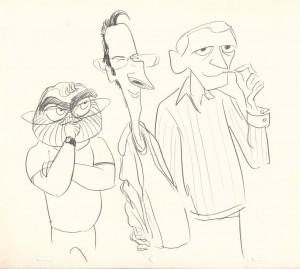John Musker Question Countdown #2
Could Howard ever have been promoted to a director, despite his relative lack of knowledge of animating a film? As I considered this question, it seemed to suggest three additional questions, all of which affect the answer to this one.
The first question is: Do I think Howard had the necessary skill set to be a director of an animated feature at Disney?
The second is: Do you think the studio executives who approved directors (and projects) at Disney would be willing to give Howard the reins to direct an animated feature?
The third is: Would artists be comfortable being directed by someone who was outside their ranks?
Let’s start with the first of these. Based on my work with Howard, and the work I saw him do in the theater, I definitely believe he had the skills necessary to direct one of these feature magillahs. The directors I know in animation who I feel are the most successful are strongly grounded in story. Howard was a writer with a solid sense of both story structure as well as sharp, character-driven, witty dialogue. He could connect with and communicate emotional sincerity, no matter how outlandish the situation. He had the goods.
Directors in animation generally have a strong feel for visual story telling as well. Howard’s staging of Little Shop was chock full of arresting visuals. It was almost an animated film turned into live theater. He had a sharp eye for contrast, and above all caricature, and the inherent fun in broadly realized characters, situations, and settings. Such knowledge is vital for an animation director.
One must also be observant of the way people communicate, both consciously and unconsciously. One must have a knowledge of the physics at play in the movement of people, creatures, objects. But equally importantly, one must also have the ability to distill those observations, to trim away confusing details, and get to the heart of an action, an attitude, a dramatic situation. Howard had those abilities, I believe, in spades.
Animation directors should have a sense of entertainment and above all, Howard was an entertainer. He made plays and songs not just for himself, but for audiences. I think Howard valued his own Everyman sensibilities that were mashed together with his more outré tastes.
Certainly, Howard knew actors and acting. His demos for the films we did together, many of which featured him performing the songs, showed great acting, whether comic turns like Sebastian, Louis the Chef or Ursula, or plaintive cries from the heart like Ariel or Audrey in Little Shop. I saw him communicate these ideas adroitly and specifically to the stage and voice actors and actresses with whom he worked. I think he would be no less clear, explicit, and successful explaining these ideas to the animators themselves, the “actors” responsible for bringing these characters to life.
As for the second question, would Jeffrey Katzenberg have been comfortable having Howard direct an animated feature? Over time, I think Jeffrey would have seriously considered this. Jeffery was in awe of Howard’s talent. This did not stop him from essentially throwing out Howard’s treatment and songs on Aladdin, though, when he didn’t like the scripts that were written (by others) as they tried to flesh out Howard’s treatment. I think Jeffrey would have thought the risk of Howard as a non-animator was worthwhile (and besides, Jeffrey harbored the thought that he really directed those animated features himself, so what would it really matter… though I, and several other directors with whom he collaborated, would beg to differ on this.)
Additionally, in recent days, there have been some successful crossovers from live action directors who dabbled in animation (what’s next, cats and dogs living together?! The end of the world as we know it?!) Gore Verbinski helmed Rango, which was well done and pushed animation into some new areas because of Gore’s taste and abilities. Wes Anderson’s Fantastic Mr. Fox managed to convey his off-center point of view, but worked as an animated film, too. Spielberg and Zemeckis have also directed animated films (albeit with motion capture.) All of this suggests that Howard, despite his newness to animation, could have parlayed his other strengths and perhaps leaned a bit on people who knew the medium better, to get the results he was looking for.
Would the Disney artists have embraced Howard as a director? It’s pretty hard to say. The crew on Mermaid loved Howard’s songs, and for the most part saw him as a kindred spirit. I think Howard would have been a fairly demanding director, but I think there would be no lack of ideas or passion, both of which help inspire the crews producing these films. I think there might have been some initial wariness that would have disappeared over time. When we made Little Mermaid, Peter Schneider, who ran the animation department for Roy Disney and Jeffrey, made me a co-producer with Howard. This was an attempt to not let us be “out-voted” by Howard so that we might be less threatened by him, and have a chance to redirect him if he was somehow pushing the film in ways that didn’t work for animation. I don’t recall ever really having to play this card. Howard seemed to respect our judgment, particularly Ron Clements’ when it came to story. Although we had occasional differences with Howard, on the most important issues, we were creatively in synch.
Certainly, there would have been obstacles to overcome for Howard to direct animation at Disney. Howard didn’t draw, as far as I know, and the best directors at Disney have all drawn. Drawing helps very directly communicate ideas on a number of fronts, whether there are questions in the animation of poses or expression, or in layout where camera placement and movements are determined, where eye levels are established, and shots are framed. Howard probably would have had to find a strong draftsman or draftswoman, with whom he could work to sketch out what was in his head (as I suspect he did to a lesser extent in his theater work.*)
There were logistical issues that would have complicated Howard directing at Disney. Howard would have had to relocate from New York to Los Angeles for a much longer piece of time. That would have been difficult as Howard’s partner Bill had strong ties to his business in New York. And Howard had his ties to the theatre community in New York.
When we were recording Mermaid’s music at the sound stages at Radford in Studio City, I remember strolling around the neighborhood with Howard during some of the orchestra’s breaks. He told me that, were he to live in Los Angeles, this was a neighborhood where he would have liked to live. I think he found its pleasant low-key lack of ostentation comforting. Perhaps it reminded him of his roots in Baltimore (I’m presuming he lived in the suburbs, am I right, Sarah? **)
There is also the question, would Howard have had the patience to do this over the length of time it takes to produce an animated feature. I think this would have been one of the hardest things for him. Howard liked quick results, it seemed to me, and the slow nature of animated feature production might have driven him bonkers. I’m not sure he could have kept several irons in the fire, both in animation, live action, and stage work and still directed a feature on a full time basis. To keep all those things simultaneously alive and still devote the time and focus to direct a feature, would have been tough for him.
Dealing with the “hands on” mania of Jeffrey might also have proven impossible for Howard to stomach (Henry Mancini, who scored and wrote songs for Great Mouse Detective and encountered Jeffrey’s methods, described JK’s involvement in that project as “hands, elbows, arms on…” and acted it out while sitting at the piano.) In the world of theatre, Howard dealt with producers and backers, and I suspect some of them had ideas that Howard thought were less than stellar***. But the level of Jeffrey’s intrusiveness may have proven to be too much for him.
As I recall, when Howard initially pitched and wrote Aladdin, I think he intended to direct it. He may have thought, after having watched Ron Clements and I at work: “How hard can this be if these guys are doing it?” Howard was always big on controlling his work, not letting it get fouled up by someone else who came between him and the audience. I think that made the idea of directing one of these animated features tantalizing to him.
All of this is speculation. All I can say definitely is that the idea of Howard directing an animated feature intrigues me no end. With his gift for character, story, staging, visuals, caricature, humor, and entertainment in general…who knows what might have emerged from that restless mind and passionate spirit? I would have been the first in line to see it.
Sarah’s asterisks:
*All directors work closely with their set, lighting and costume designers (their equivalent of animators, I guess). But I’d add that Howard worked closely with Marty Robinson, who designed Audrey II, which I think is particularly relevant to the animator question.
**Yup.
***Yup, yup, yup.

